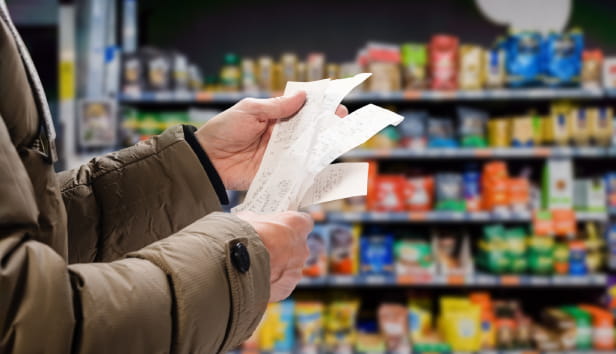/senior-stylish-woman-taking-notes-in-notebook-while-using-laptop-at-home.jpg?la=en&h=750&w=1440&hash=74EEAE971CAF6210601FB065BBCCE642)
/senior-stylish-woman-taking-notes-in-notebook-while-using-laptop-at-home.jpg?la=en&h=750&w=1440&hash=74EEAE971CAF6210601FB065BBCCE642)
This article is for general guidance only and is not financial or professional advice. Any links are for your own information, and do not constitute any form of recommendation by Saga. You should not solely rely on this information to make any decisions, and consider seeking independent professional advice. All figures and information in this article are correct at the time of publishing, but laws, entitlements, tax treatments and allowances may change in the future.
With the festive season in full swing, there will be many demands on your time and wallet. December can be an expensive month. Whether you’re looking to lighten the financial load, or get yourself organised for 2025, we’ve got the tips you need.
Jump straight to:
It’s the season of goodwill and you may well be thinking about giving money to your children and grandchildren. If there’s a chance that your estate might be liable for inheritance tax, it’s something to bear in mind when you give gifts of money, as they could be subject to inheritance tax later.
Currently, IHT is payable if you die with an estate worth over £325,000 (the nil rate band), but that can be boosted by a further £175,000 if you are passing on a family home to children or grandchildren (the residential nil rate band).
That means a married couple passing on their home can leave £1m to their loved ones before IHT will become payable as transfers between spouses (and civil partners) are tax free. There are a number of tax-free allowances to take advantage of, so spend some time familiarising yourself with the inheritance tax gifting rules.
Your estate won’t be liable for inheritance tax on any of these:
.jpg?sc=max&mw=800&h=450&la=en&h=731&w=1300&hash=D6BF66DE5E4539FEF99C1C3A346BF39D)
Following two cuts to the Bank of England base rate this year, it’s likely the rate you are earning on your savings has fallen. For that reason, it makes sense to check whether you are still earning a decent rate and switch if necessary.
Over the years inflation can chip away at your cash, so it’s important your money earns the best rate possible. You can choose between a wide range of accounts, such as regular savings accounts, fixed-term accounts and easy-access, depending on your needs.
Independent websites such as Moneyfactscompare or Money Saving Expert can help you compare different savings accounts.
.jpg?sc=max&mw=800&h=450&la=en&h=731&w=1300&hash=90C268E7856046DF38CBBF777CEE69DF)
If you have any income that’s not from employment or through PAYE, you may need to complete a self-assessment tax return. The deadline for submitting your tax return online to HMRC is 31 January (the deadline for submitting paper returns passed on 31st October).
Miss this deadline and you’ll get an instant £100 fine and risk further charges down the line.
Although filing your tax return will invariably be a bit of a chore, Fiona Fernie, a tax partner at advisory firm Blick Rothenberg, says it’s best not to leave it until the last minute - the HMRC online portal and telephone helplines get overwhelmed in January.
It may also take you some to gather together all the information you need. Another benefit is that it will give you time to plan how you’ll pay your tax bill.
“It’s certainly not a good idea to calculate your tax bill in January, only to find you’ve spent the funds on Christmas,” she adds.
.jpg?sc=max&mw=800&h=450&la=en&h=731&w=1300&hash=26EDF2DC584C0C8E9BD33E57C1365BC2)
Our spending normally increases in December. On average, Britons spend almost £600 on Christmas-related gifts, food and activities. A credit card can help you spread the cost (since you won’t have to repay your December spending until at least January, or potentially even longer if you go for an 0% purchase card).
If you’re spending on a credit card, always remember to make at least the minimum payments, don’t spend more than you can afford to pay back, and bear in mind they can be expensive once you’re outside the 0% period.
Even if you already have one or more credit cards, it can be worth shopping around for an 0% purchase card, or a card that offers you cashback or reward points, to see if you can beat the benefits on your existing cards.
Some credit cards offer extra cashback for an initial period, so early December can be a good time to take one out if you usually spend more in this month.
Credit cards can also give you valuable protection if a gift isn’t up to scratch or doesn’t arrive, or you are scammed, or if something else goes wrong. That’s because the credit card provider is jointly liable for the transaction.

Entering competitions can be a great way to pick up gifts for friends and family. During December many brands host ‘Advent’ or ‘12 Days of Christmas’ promotions with daily winners.
You can win small prizes like beauty products and toys – but could even win a TV or luxury holiday, says Di Coke, founder of competition website SuperLucky. Cash and vouchers are the most popular prizes in the run up to Christmas.
When you’re out shopping. Look out for instant win promotions on product packaging, and text-to-win promotions advertised on supermarket shelves and displays (which typically cost about 15p to enter).
“Usually [but not always] you will need to buy a specific product and keep your receipt to enter. At this time of year there are lots of prize draws where you need to buy books, chocolate and alcohol to take part, and these ‘qualifiers’ make great gifts for the family too,” says Coke, who also shares competitions on Instagram, where she can be found @superluckydi.
SuperLucky is one of several competition websites that can point you towards the latest competitions. Watch out for scammers though. Make sure the competitions you enter are hosted on the websites or social media of reputable brands.
Many brands also offer the chance to win a prize if you complete their survey, but be aware that these can take time to fill in and in some cases you may be asked for detailed personal information.
If your time is at a premium, many social media giveaways can be entered without giving your name, email or postal address unless you’re a winner, so you can enter lots of giveaways in a short space of time.
Entering these typically means you have to follow the brand on social media, “like” their post and in some cases share it with a friend, so think about whether this is something you’re happy to do.
/mature-blonde-woman-holding--mobile-phone.jpg?sc=max&mw=800&h=450&la=en&h=731&w=1300&hash=DA1D74CF8571F46C30F620F005333824)
You don’t usually need to insure Christmas presents you have bought, as insurers typically automatically increase your contents cover in December. It could be worth checking whether yours does, especially if you’ve bought expensive gifts.
It’s usually described as “festive uplift” or “seasonal uplift”. Now could also be a good time to check you have the correct home and contents insurance. It’s easy to auto-renew each year without considering whether anything has changed in your home.
Helen Phipps, Director at Compare the Market, says: “If you’ve lived in your property a long time, your needs for the cover and features in your policy may have changed. It’s worth checking the details and ensuring your policy aligns with the real value of your property and its contents.”





From their first savings account to their first home, find out how your gifts can make the biggest impact for your grandchildren

/mature-couple-looking-at-taxes.jpg?la=en&h=650&w=1400&hash=5CFABEEDC751F26D56DD3E85749E3C36)
.jpg?la=en&h=650&w=1440&hash=D2D232A61FCEAEBDC0D69D8AE38E8E41)
